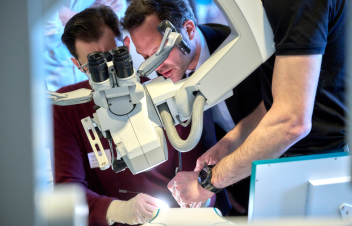Stepping into Scrubs: A Roadmap to Surgical Tech Training and Career Success
- surgeonslab1
- Apr 26, 2024
- 3 min read

The fire that burns within aspiring surgeons is truly something else. The image of carefully wielding the scalpel, saving lives in the operating room, and pushing the boundaries of medical research is what keeps their ambition alive. Thus, this dream becomes a long-awaited and incredibly fulfilling reality. One of the vital elements is the unique combination of mental intellect, accurate technical skill, and surgical tech training. This is a guide for those aspiring to be a surgeon in the future.
Building a Strong Foundation
The cornerstone of the exemplary surgical profession is a strong undergraduate education, preferably in the field of pre-med. Biology, chemistry, physics, and mathematics courses are the basis of your scientific knowledge. These subjects contribute to the fundamental one of the intellectual processes you will face later. Along with your academics, go for collaborations and other research projects. Spending time in the lab is the best way to understand the witchcraft that breaks scientific boundaries.
The same is true for volunteering, which takes place at hospitals or other clinics, for example. Being in person with healthcare delivery may be a priceless experience. One will get a glimpse into the real-life challenges of patient care and the surgeon's position in the medical team.
The Crucible of Medical School
Another great step is being able to make it through an accredited medical school admission process. The curriculum itself is typically divided into two distinct phases: laboratory and human. During the first 2 years, you'll get detailed about the basis of medicine by studying such subjects as anatomy, physiology, pathology, and pharmacology. These sciences serve as foundations of the medical sciences and offer in-depth knowledge of health and disease.
The latter half of the medical school is in the clinic, and the second semester is already in a hospital environment. Rotations in the clinic get valuable hands-on experience from different specialty points. You'll work alongside attending physicians, witness surgeries, and participate in patient care. This is a critical juncture for building up your enthusiasm and potentially discovering a specific surgical path that resonates with you. For instance, if neurosurgery is the specialty you want to pursue, then you would need to look into Neurosurgery residency programs that will suit you.
Fellowship: Deep Dives into Subspecialties
A lot of surgeons decide to undertake specialized training in a subfield they find most appealing by enrolling for a fellowship. Additional training introduces subspecialty subjects like pediatric surgery, cardiothoracic surgery, or neurosurgeon training. Fellowship is usually a one-year to three-year training that provides an opportunity to hone desired advanced surgical techniques for the subspecialty of your selection. It's a dive into a particular direction of the surgical practice regarding the expertise of the particular field.
Lifelong Learning: A Commitment to Excellence
This profession requires one to engage in professional development through continuous medical education (CME). CME activities spread in various forms, which range from being a member at conferences, attending workshops, and undertaking accredited online courses.
Refining Your Skills in Residency
Once you have graduated from medical school, the next step of this path is to compete with peers for these renowned surgical residency programs. Residency is an extremely stressful and educational time, usually five to seven years, depending on which specialty in surgery is chosen. It is an apprenticeship with senior surgeons who will provide the necessary instruction.
Among mentors, you will be able to work closely with them, starting with small duties and then gaining more responsibility as you gain more surgical skills and maturity. A vital part of residency is this period when you refine your surgical skills. Resident training often includes tech training, which allows hands-on experience with surgical instruments and technical procedures in a controlled manner.
The Journey Continues: A Life of Dedication
Ultimately, a surgeon's road is not a fast sprint; it's a marathon that lasts a lifetime. It calls for determination, unyielding discipline, and remorselessly endless pursuit of continuous improvement. There will be times of immeasurable pleasure when you get to observe the miraculous effects of surgery with your own eyes. Along with the challenges, long hours, complicated procedures, and the emotional burden of patients will also be on the list.
Still, for someone who is strongly committed to patient care, has a passion for solving problems, and is ready to accept the challenges of the profession, the rewards of surgical tech training are immeasurable. You will get a rare opportunity to use a scalpel not only as a tool but also as a power of healing, innovation, and positive change in the lives of many patients.







